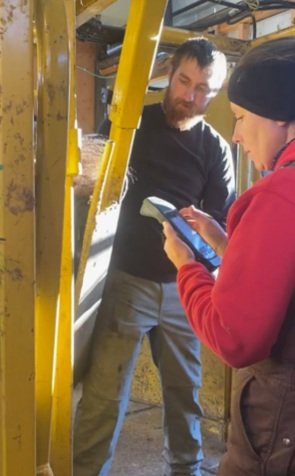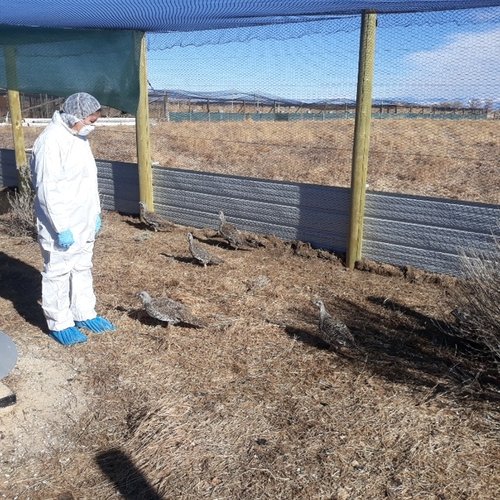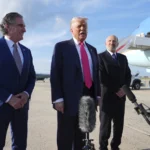WOMEN YOU SHOULD KNOW IN WYOMING: State Veterinarian Works to Keep Livestock Healthy
Dr. Hallie Hasel brings three decades of experience as she monitors, educates about animal diseases
- Published In: Other News & Features
- Last Updated: Apr 05, 2023

By Elizabeth Sampson
Special to the Wyoming Truth
Dr. Hallie Hasel’s work takes her from the halls of government to the backyard chicken coop. One day she might address Wyoming legislators about a livestock bill, and the next day she could speak to chicken farmers about the threat of avian influenza.
As Wyoming’s state veterinarian, Hasel protects the health of all Wyoming livestock, whether that be cattle, horses, sheep, chickens, bison or even yak.
Hasel—pronounced like the eye color or the nut—has been a veterinarian for 31 years and the Wyoming state veterinarian since July 2021 when she moved to Cheyenne from Texas.

Much like the public health department keeps an eye on diseases that can become problematic for humans, Hasel focuses on animal disease prevention, surveillance, control, eradication and education.
For example, the number one disease issue in the western part of Wyoming is brucellosis, a bacterial disease that causes abortions in animals. The disease is found in elk and bison living in and around Yellowstone National Park; currently it is limited to a designated surveillance area in Wyoming, Montana and Idaho.
“Our goal is to make sure brucellosis never escapes that region into anywhere else in the United States,” Hasel said.
She works with producers to prevent the cohabitation of elk and cattle, especially during calving season. Keeping them apart has been especially difficult this year, Hasel said, because severe winter weather pushes the elk herds to feeding grounds in lower elevations and closer to the cattle.
“We require the cattle to be tested before they can leave that area and upon change of ownership,” Hasel said. “We request they do annual herd tests whenever they are doing other herd work. It’s a lot of work for the producers, but it allows not only them, but the whole state of Wyoming, to be better able to market Wyoming’s cattle to the rest of the United States.”
Hasel cooperates with the U.S. Animal Health Association and the United States Department of Agriculture (USDA) Veterinary Services to keep abreast of emerging diseases that could become an issue in Wyoming.
“The world is a small place, because they can arrive here so quickly and so easily—and they do,” Hasel said. “We had rabbit hemorrhagic disease a few years back or the influx of avian influenza right now. We’re trying to work with the increasing number of poultry producers within our state, which is something new because of the demand now for backyard flocks.”
Hasel said African swine fever is a severe threat that would be devastating to U.S. swine herds if it came to this country.
‘Always explore the edges’
An Oregon native, Hasel determined her career path in early childhood: veterinarian.
“There was no other choice for me,” she said, noting that women now comprise 80% of veterinary school graduating classes. “It was just the one option, and I wouldn’t trade it for anything.”
Hasel said she was raised with livestock and felt more comfortable with horses and cattle than people. “Animal behavior has always been fascinating to me, and offers much if we are willing to listen and learn,” she said.
After graduating from veterinary school at the University of Missouri-Columbia in 1992, Hasel spent about 20 years in a private practice in Kansas, where she primarily worked as a cow/calf feedlot veterinarian. Hasel became a field veterinarian with the USDA in 2003, working with livestock producers to address any disease under a federal eradication or control program—tuberculosis, brucellosis and avian influenza, to name a few.

In 2014, Hasel moved to Austin to become the Area Veterinarian in Charge of Texas with the USDA Veterinary Service; a year later, she accepted a position as director of the USDA Cattle Fever Tick Eradication Program.
The role was demanding, but Hasel enjoyed the cultural education and experience of collaborating with multiple state and federal government agencies.
“Each region of the United States has disease issues specific to their area,” she said. “Although the diseases are different, the challenges are similar.” This job covered about 600 miles on the Texas-Mexico border, and Hasel led a team of 120 employees.
In 2020, Hasel moved to Wyoming to be closer to her family in western Kansas. She appreciates the innate natural beauty of the state and enjoys horseback riding and skiing.
“I do love to hike, but not when the winds are greater than the temperature,” she said.
Dr. Teckla Webb, assistant state veterinarian-field operations, praised Hasel’s industry knowledge and said it enables her to make informed decisions when advocating for animal health.
“She understands ranching; she understands the cow-calf operation,” Webb said. “When a rancher says, ‘This is going to affect my herd because I am going to have an astronomical feed bill,’ Dr. Hasel . . . knows exactly what they’re talking about. Because of that, she can help make decisions to ease the burden on that person.”
Webb said Hasel effectively communicates across multiple groups of people, connecting not only with producers, but also government agencies like Wyoming Game and Fish.
“When we are in a specific disease situation, if available, she will go in person, and we’ll have meetings with a rancher, their veterinarian and us,” Webb said. “That’s really effective, because we’re able to look at all of their ranch data and figure out the best outcome.”
After three decades as a veterinarian, the advice Hasel offers to young vets—and reminds herself of daily—is to seek to understand so that you may be understood. It’s concept, she said, that requires empathic listening, particularly when visiting other cultures.
That really hit home when Hasel went to Ghana in 2007 as a participant in a Kansas Agriculture and Rural Leadership Program (KARL), Class VIII. The people she was visiting awaited a shipment of tractors from another country, but they lacked the parts to fix them, and no one knew how to work on them.
“You really have to understand how life operates wherever you might be,” Hasel said. “It doesn’t mean you can’t go outside your box, but you also need to find out, ‘What is the reality where I am?’”
Hasel also said it’s important to think outside the box when problem solving with producers.
“When you come out of school, you think you know a lot of things, and you do,” Hasel said. “But listen to what [producers] have to tell you before you give them your advice. Always be open-minded and try to find that third-party solution. There’s what you want, and there’s what the producer wants. What can you do that will satisfy both of you and make it better for everybody? It’s a very difficult thing to come up with, and it does require some compromise. But never put your head into that box. Always explore the edges and what else is out there.”













